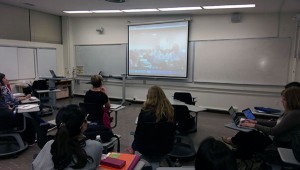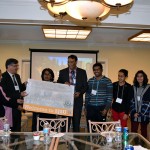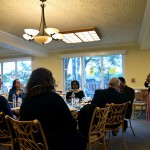
Photo courtesy of Jason Laker
Connie L. Lurie College of Education students engage with peers from Allama Iqbal Open University in Pakistan via online video conference.
In Xochilt Garcia’s Gender and the Male Student course, she and her peers connected via video conference to students in Pakistan for almost every class session.
“Our first session was a bit awkward at first due to both sides being timid about standing in front of a screen,” she said. “However, as a discussion was initiated, everyone on both sides of the world started to become engaged and talkative.”
Garcia’s course was taught by Dr. Jason Laker using a technique called Collaborative Online Intercultural Learning (COIL).
“Out of my six years in higher education, never have I had such a learning experience where we discussed issues such as race, gender, religion, and discrimination with people that we oftentimes define as different,” she said. “Within American society, we are at times trained to learn about cultures through comparison and differences. However through COIL, I learned to look at similarities in humans regardless of all the (identities) we may identify with.”
Garcia’s class connected with students at Allama Iqbal Open University (AIOU) in Pakistan, where SJSU was engaged in a three-year U.S. State Department grant, the Pakistani Distance Education Enhancement Program overseen by Mark Adams. The grant ended in January 2016, but COIL collaborations continue.
“It was interesting to bridge the gap between two different cultures – both classrooms were not too different,” said Muhammad Ramzan, a Pakistani student, after engaging in a Skype conference with SJSU students. “It was the best use of technology…I (felt like) we were all sitting together and discussing with each other.”
Laker said as the counseling education program serves many working students and offers courses in the evening, it worked well to schedule Skype sessions with students in Islamabad, where it was early morning during his nighttime class sessions.
“I teach graduate courses for students preparing to become school counselors or college student affairs practitioners,” Laker said, noting the importance of developing multicultural skills. “One of the particularly poignant aspects from my perspective is the number of first-generation students on both sides. Students on both sides said they never thought they would ever have an opportunity to talk with peers in other countries.”
Minna Holopainen, a professor of communication studies, has been integral in supporting COIL. She presented on it at the IT Services Innovation and Collaboration Expo in October 2015. She has worked with other faculty on campus including Bettina Brockmann, a lecturer whose class worked on a water project through COIL, and Assistant Professor Tabitha Hart, who is currently using the technique in her communication studies classes.
For two semesters, Hart has had her students conduct a written exchange with students from AIOU. She and a partner teacher in Pakistan select a writing prompt for the students. The SJSU students have a chance to read and respond to the prompts from the Pakistani students, who do the same with the SJSU write ups. Last year, the students wrote about special education.
“The way the students had experienced special education, what it meant and how they observed it was quite different,” Hart said, noting that the Pakistani students wrote about physical disabilities while SJSU students also mentioned less visible disabilities such as cognitive or emotional issues. “What was interesting is that they did see similarities and they saw differences as well.”
In some of her classes, Hart also has her students engage in a live online meeting with students from Germany, Finland and Great Britain. The students learn how to set up an online meeting that includes audio and video with someone overseas and they use the interviews to learn about different cultures.
“There are students who have had an international experience – they or their family or extended family have traveled or moved from another country – but the majority of students have never had to do something quite like this,” Hart said. “We talk about international and globalization culture – it is a value at SJSU. The tough question is how are we going to actually do that and this is a very direct way to do it.”


